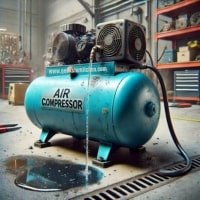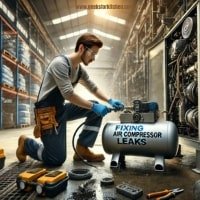Air Compressor Leaking Air
Air compressors are essential tools in various industries, providing the power needed for pneumatic tools, spray painting, and other applications. However, one common issue that users often encounter is air compressor leaks.
These leaks can lead to inefficiencies, increased operational costs, and potential damage to the compressor itself. In this comprehensive guide, we will explore the causes of air compressor leaks, how to identify them, preventive measures, and effective solutions to fix the leaks.
Air Compressor Leaking Air
We will discuss here the causes of Air Compressor Leaking Air:
1. Worn or Damaged Seals
Seals are crucial components that ensure the air remains within the compressor system. Over time, seals can wear out or become damaged due to constant use, exposure to extreme temperatures, and pressure fluctuations. When seals degrade, they fail to maintain a tight seal, leading to air leaks.
2. Loose Connections
Air compressor systems consist of numerous connections, including fittings, hoses, and valves. If any of these connections become loose, air can escape, causing a leak. Vibration during operation can contribute to the loosening of these connections over time.
3. Faulty Pressure Relief Valve
The pressure relief valve is designed to release excess pressure to prevent damage to the compressor. However, if the valve is faulty or improperly adjusted, it can allow air to escape even when the pressure is within the normal range.
4. Cracked or Damaged Hoses
Hoses transport compressed air from the tank to the tool or application. If hoses are cracked, punctured, or otherwise damaged, they can leak air. Hoses can deteriorate due to age, exposure to harsh environments, or physical damage.
5. Corroded Components
Corrosion can occur in various parts of the compressor system, especially if the equipment is exposed to moisture or corrosive substances. Corroded components can develop holes or cracks, leading to air leaks.
Identifying Air Compressor Leaks
1. Audible Hissing Sound
One of the most common signs of an air leak is a hissing sound, which indicates escaping air. This sound can often be heard even when the compressor is not in operation.
2. Reduced Air Pressure
If your air tools are not performing as expected or if the compressor takes longer to reach the desired pressure, it may be due to an air leak. Reduced air pressure can significantly affect the efficiency of your pneumatic tools.
3. Visible Damage
Inspecting the compressor for visible signs of damage, such as cracked hoses or loose fittings, can help identify the source of the leak. Regular visual inspections are crucial for early detection.
4. Soapy Water Test
A practical method to locate leaks is the soapy water test. Mix soap and water in a spray bottle and apply it to suspected areas. Bubbles will form where air is escaping, pinpointing the exact location of the leak.
Preventing Air Compressor Leaks
1. Regular Maintenance
Routine maintenance is vital to ensure the longevity and efficiency of your air compressor. Regularly inspect and replace worn seals, tighten loose connections, and check for any signs of damage.
2. Use High-Quality Components
Investing in high-quality hoses, fittings, and seals can reduce the likelihood of leaks. Quality components are more durable and less prone to wear and damage.
3. Proper Installation
Ensure that all components are installed correctly and securely. Improper installation can lead to loose connections and potential leaks. Follow the manufacturer’s guidelines for installation procedures.
4. Monitor Operating Conditions
Maintain optimal operating conditions for your air compressor. Avoid exposing it to extreme temperatures, moisture, or corrosive environments that can accelerate wear and damage.
5. Regular Inspections
Conduct regular inspections of your air compressor system to detect early signs of wear or damage. Early detection allows for timely repairs and prevents minor issues from becoming major problems.
Fixing Air Compressor Leaks
We will discuss here methods that how we can fix the leaking problem of the air compressor.
Method 1: Tighten Connections
Any loose components or exposed vents on your compressed air system can be a potential risk for damage. To ensure no obstructions or leaks when in use.
You should regularly check over any connection points and tighten any loose parts.
This way, you will save time and money by preventing wear and tear caused by the constant usage of your machinery.
Method 2: Repair or Replace Parts
Air leaks can occur when old parts get damaged or worn out. Some typical air compressor leak locations include filters, lubricators, regulators, and flanges.
If you have spare time, try replacing these worn-out components with modern ones. A simple repair like replacing the filter can go a long way toward ensuring that your machinery runs smoothly and efficiently daily!
Method 3: Swap Out Hose and Tube Sections
Leaks in air hoses are widespread, and they’re usually easy to spot. Get some hand sanitizer or dish soap and spray a few squirts down the hole where you think the leak is when it happens.
You’ll observe bubbles pouring out of wherever there’s a leak the next time your motor starts on! Remove the leaking tube portion and replace it with a new one.
Method 4: Replace Valve Seals
Rubber is a material that can deteriorate over time, particularly when subjected to heat, chemicals, and forces that cause the rubber to harden and split.
O-rings, also known as valve seals, are small components of an air compressor that, if worn out, can make it difficult to maintain a good seal and cause air leakage.
If your equipment has rubber parts, you should change them regularly to eliminate leaks and save money on compressed air.
Method 5: Tighten Fasteners
While this last approach takes a little longer, fixing your air compressor yourself is a worthwhile and inexpensive remedy that will extend the life of your compressor.
Internal loose components, which destabilize the motor over time, are frequently the cause of air leak repair and pressure regulator difficulties.
Tightening those screws and fasteners will assist keep things in check once and for all if you notice any unsteady or overly noisy components.
FAQs
Why does my air compressor leak air?
Some of the most common causes of air compressor pressure loss include failed filters and lubricators, obsolete regulators, flanges, and leaking drains.
It’s possible that you won’t notice how brittle or worn these components are until it’s too late. Investing in quality parts to ensure that your compressor is operating at peak efficiency will pay off handsomely!
Why is my air compressor leaking air?
Air compressor leaks can occur due to various reasons, such as worn-out seals, loose fittings, damaged valves, or malfunctioning pressure switches.
Over time, seals and gaskets can deteriorate, resulting in air leakage. Loose fittings or connections can also lead to air escaping. It’s essential to inspect your air compressor regularly to identify the specific cause of the leak and take appropriate measures to address it.
How can I detect air compressor leaks?
Detecting air compressor leaks can be done through a few methods. One common approach is to listen for hissing sounds around the compressor or along the air lines, indicating the presence of air leakage.
Another method involves using a soap and water solution to apply to the fittings and connections. If bubbles form when air is flowing, it indicates a leak. Additionally, monitoring the pressure gauge for significant drops or fluctuations can also help identify leaks.
What can I do to fix an air compressor leak?
The appropriate solution for fixing an air compressor leak depends on the cause of the leakage. For minor leaks caused by loose fittings or connections, tightening them securely can often resolve the issue. If the problem is due to worn-out seals or gaskets, they may need to be replaced.
Similarly, damaged valves or malfunctioning pressure switches may require professional repair or replacement. It’s important to consult the manufacturer’s instructions or seek the assistance of a qualified technician for complex repairs to ensure proper resolution and prevent further damage.
Can an air compressor explode?
Air compressors can explode if the tank is rusted. Corrosion of a tank increases internal pressure, which may be too great for the tank to withstand, and it will burst, or worse yet, in some cases, even explode.
Bottom Line
Air compressor leaks are a common but manageable issue that can affect the efficiency and longevity of your equipment. By understanding the causes of leaks, identifying them early, and implementing preventive measures, you can maintain an efficient and reliable air compressor system. Regular maintenance, high-quality components, and timely repairs are key to preventing leaks and ensuring optimal performance.


